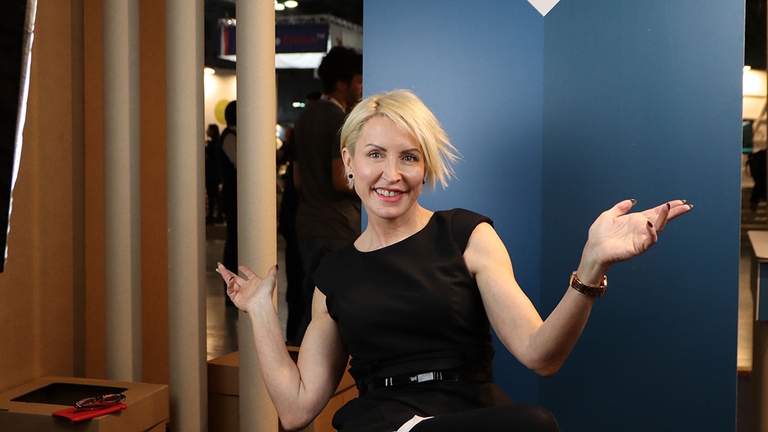
Factory farming conditions and antibiotic-resistant pathogens emerging as a result of them pose an existential threat to humans in the form of zoonotic diseases. Why it’s time to produce and consume food more thoughtfully.
She healed completely by becoming vegan over 25 years ago following an accident that cost her her leg. We met Heather Mills at Seeds&Chips, where she told us about her pioneering food company VBites.
Heather Mills is a multi-talented former model, media personality, speaker, activist, entrepreneur and the fastest disabled female skier in the world, setting the record at over 160 kilometres per hour. She participated in the food and innovation summit Seeds&Chips 2019, held in the Italian city of Milan from 6 to 9 May, with her business hat on, as the founder and owner of VBites, company that has been producing plant-based alternatives to meat, fish and dairy since she pioneered this model over a quarter of a century ago, following the accident in which she lost a limb.
Going vegan allowed her to heal completely, avoiding further amputations, so she decided to share her experience with the world by making this type of diet accessible to consumers. “Being raw vegan was impossible in cold England, so I started to make vegan burgers, vegan fish, vegan chorizo, everything. On a soya base, then a coconut base, then an algae base – over 26 years we became the largest 140-product meat, dairy and fish-free company in the world”.
Read more: Plant based alternatives attract investment from meat producers
View this post on Instagram
An extremely successful venture (Mills cites “960 per cent growth in the last three years”) that has developed many vegan products, from food to makeup and shoes, to cater to people’s needs as well as their desire to safeguard their health and that of the planet. These products are increasingly appetising for investors in today’s market and in the future “the movement, as long as the food is brilliant and you replace like for like, will just boom completely,” Mills forecasts. But this hasn’t always been the case. “I wrote about climate change 20 years ago, where we would be at and what needs to happen, when nobody was listening,” she continues, a clear reference to her role in shedding the spotlight on topics, such as our food system being one of the principles causes of global warming, which many of us take for granted nowadays.
In fact, the intrinsic connection between the choices we make surrounding nutrition, who grows our food, as well as how this is cultivated and distributed with the environmental degradation the world is facing on so many fronts is so strong – and obvious – according to Mills that “if you’re not vegan, you don’t believe in climate change”.
Read more: How agriculture and climate change are related: causes and effects
Seeds&Chips is the most important international summit on the topic of innovation in food. It is held annually in the Italian city of Milan during Milano Food City, a week dedicated to the world of food, agriculture and nutrition borne out of the heritage left by the Expo 2015 World Fair, whose theme was “Feeding the plant, energy for life”. This year Seeds&Chips took place between 6 and 9 May, at Fiera Milano Rho. LifeGate was media partner to the event with the aim of giving voice to speakers, policymakers, NGOs, startups and companies in the debate around one of the most pressing challenges of our time: feeding a growing world population sustainably. Comment posts with the hashtag #SaC19. Thanks to BWT Italia.
Siamo anche su WhatsApp. Segui il canale ufficiale LifeGate per restare aggiornata, aggiornato sulle ultime notizie e sulle nostre attività.
![]()
Quest'opera è distribuita con Licenza Creative Commons Attribuzione - Non commerciale - Non opere derivate 4.0 Internazionale.
Factory farming conditions and antibiotic-resistant pathogens emerging as a result of them pose an existential threat to humans in the form of zoonotic diseases. Why it’s time to produce and consume food more thoughtfully.
The world of cinema recognises the link between food choices and the climate crisis by offering vegan menus for awards season events, including at the most important of them all: the Oscars.
Let’s look at the reasons behind the growth of veganism in India, as a small yet vocal section of the population turns towards this diet and lifestyle in the largest milk producing country in the world.
by Jeffrey Y. Campbell, Manager of the Forest and Farm Facility at FAO In the Ecuadorian Amazon, Kichwa farmers grow dozens of products on tiny parcels of land. Their lands hum with biodiversity, yielding nutritious foods that have sustained families for generations. Wandering among fruit and nut trees and crops, these indigenous agroforesters fill their baskets
Mint has many health benefits, but in food it’s often accompanied by artificial green colourings. Instead, Galatea has created a green mint ice cream in a completely natural way.
We’re talking about Galatea, a company that produces semi-finished products for artisanal ice creams using high quality ingredients, natural colouring, excluding thickeners and hydrogenated fats, respecting the environment and supporting the less fortunate.
The mad rush to fake food, like fake meat made with genetically-modified soy, ignores the importance of the diversity of our foods and culinary cultures. It’s a recipe to accelerate the destruction of the Planet and our health.
Like with all foods, the quality of an ice cream can be discerned by reading its label. An expert explains how to do this, and tells us how their company steers clear of chemicals, using only natural ingredients to produce an excellent and “free” ice cream.
Quality ingredients, no artificial colouring and hydrogenated fats. These are the main features of a great ice cream. But what makes an ice cream parlour “good”, i.e. sustainable?








